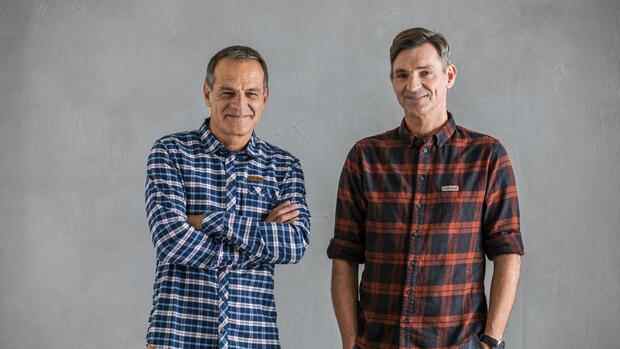Munich A birthday is coming up: This year the bike and outdoor label Maloja will be 18. “We are of legal age,” jokes founder Klaus Haas. Partner Peter Räuber adds: “Now we can do what we want.”
And that’s what the two entrepreneurs do too. They use the anniversary as an opportunity to withdraw from day-to-day business and to appoint an outside boss in the summer. They both want to reveal who they have signed in the spring. The new one is still under contract elsewhere.
Haas, 56, and Räuber, 59, have already put down on paper what their successor has to consider. “Going your own way” is the title of your book that you have just published. Together with the author Alexander Provelegios, they explain on 311 pages what matters to them at Maloja.
The two Bavarian sportswear entrepreneurs definitely want to enjoy their early retirement. But your values should be preserved even after you say goodbye to day-to-day business.
In fact, Maloja is one of the greatest success stories in the German sports industry in the past two decades. The name Maloja is a little misleading: the company is by no means based in the Engadine mountain village of the same name. Haas and Räuber only called their company that because they are so enthusiastic about the remote, rugged area in Graubünden.
The Maloja team is based in a farm
The 50-strong team works in a carefully developed farm in Rimsting, a stone’s throw from Lake Chiemsee. The cows graze in front of the terrace, the view extends over the Kampenwand excursion mountain to the Tyrolean Inn Valley. The unusual domicile is no coincidence: the farmer was one of the financiers from the very beginning.
If there’s an ideal place to design sportswear, it’s this one. The area is a paradise for mountain bikers, cross-country skiers and ski tourers. But skiers and joggers also get their money’s worth. In 2004 the management consultant Haas and the robber, who is experienced in the sports industry, started to build up their leisure brand.
They started with trend-oriented cycling clothing, and a few years after founding they also got into winter sports. Many products can be used for more than one sport. The latest idea is called “Glide & Ride”, a collection for winter cross-country skiing and for mountain biking during the rest of the year.
The approximately 50 employees use a farm near Lake Chiemsee.
(Photo: Maloja)
The many fresh colors are striking in the sports shops. In spring and autumn, the entrepreneurs bring out a 300-piece collection, each year with a new motto.
In addition, the founders set up their own factory in Bulgaria two years ago. The 270 employees at Viomoda in Plovdiv produce high-tech rainwear, padded jackets and cycling jerseys.
The collection ranges from dirndls, which cost 600 euros, to racing suits for the American national biathlon team. Haas estimates that the company should achieve a turnover of over 30 million euros this year. Little compared to sports companies like Adidas or Puma.
But enough to become a valued partner to some of the best sports retailers in Europe. From Sport Schuster in Munich, for example, or from Sport Conrad in Garmisch. Because it is part of Haas und Räuber’s credo not to work with large retail chains.
Amazon’s arrogance
They tried Amazon for a couple of years and were immensely disappointed. In particular, the arrogance of the Americans bitterly offended them. “We regret that we have made a small contribution to the fact that Amazon has become stronger and stronger and can shamelessly exploit its market power today,” Haas reckons with the Internet department store.
It is more the personal relationships on which Maloja’s success is based. He “liked Peter Räuber straight away,” remembers sports retailer Hans Conrad. He has a “certain humanity that shines through in all business acumen”.
More than once in the past 18 years the business was on the brink. The two founders last trembled in March 2020 when the sports shops suddenly had to close due to Corona. Ultimately, the pandemic gave a massive boost to sales.
Maloja benefits from the fact that consumers equip themselves for their free time in the fresh air. “There is a tremendous amount of enthusiasm for mountain and outdoor sports,” says Heiner Oberrauch, owner of the Maloja competitors Salewa and Dynafit. In addition: “Consumers have more money available, they travel less,” says Thomas Gröger, head of the Bavarian mountain boot manufacturer Hanwag.
Some brands can no longer keep up with production. “Production is now already at full capacity until July. I’ve never experienced anything like it, it’s really extraordinary, ”explains Lowa boss Alexander Nicolai. Lowa is the largest Bavarian hiking shoe manufacturer.
The supply chain chaos hits Maloja
The Maloja founders are also struggling with an extremely fragile supply chain. Haas reports that it used to take three or four months to get fabrics. It now takes up to nine months.
Nevertheless, the owners are very satisfied. 2021 was “the best year in the company’s history,” says Haas, with a clear double-digit increase in sales. It will continue like this, because the orders for the new year are “very gratifying”.
The two bosses do not want to retire overnight; it should be a well-dosed farewell that will last over two years. “It takes a young generation to be a contemporary brand,” says Räuber, who has been Maloja’s creative mind up to now. His role should not least be taken by son Julian, who has been with the company for a few years.
More: The “hiking boots Dasslers”: Hanwag wants to catch up with Lowa with new soles.
